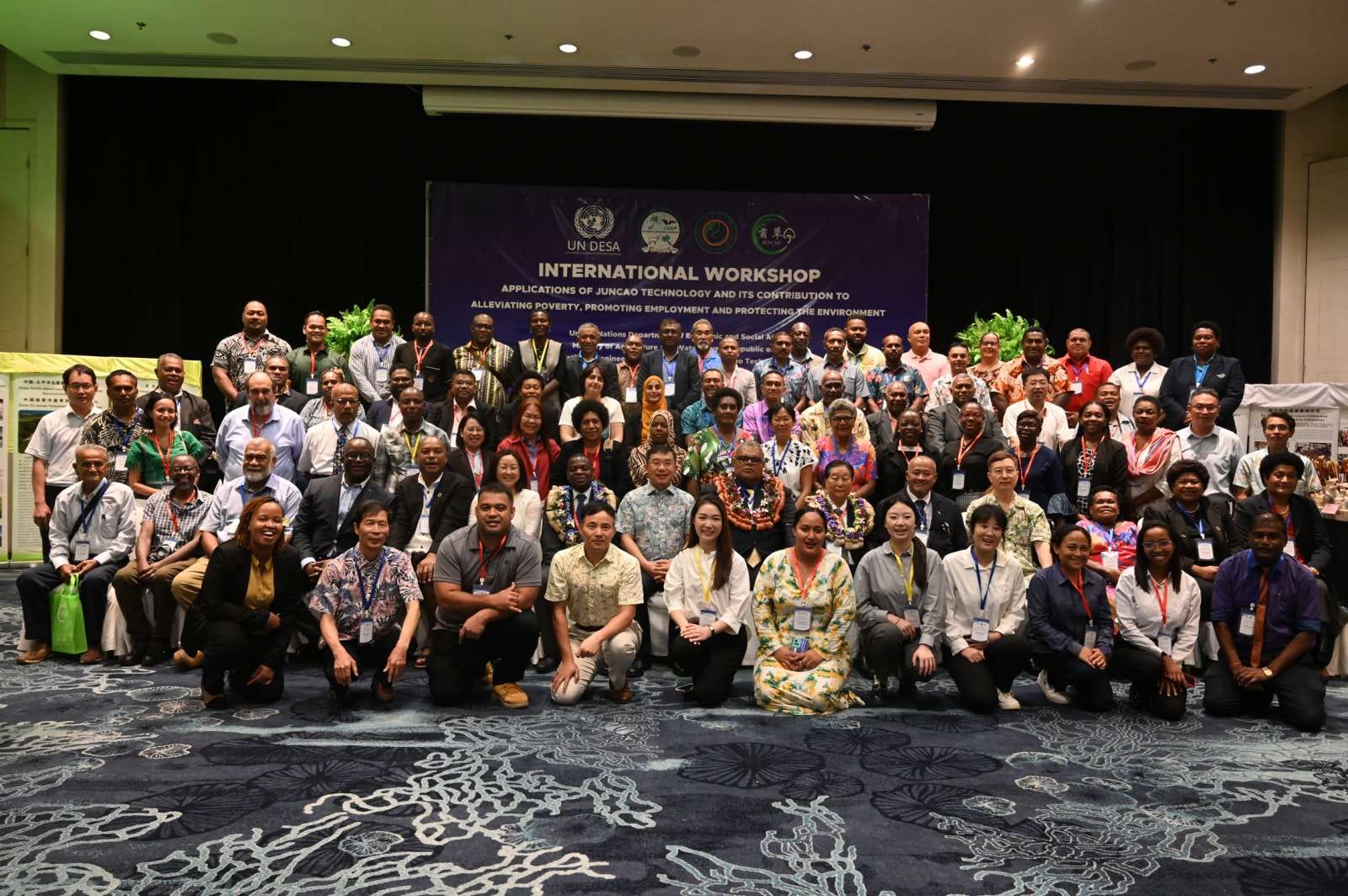JUNCAO TECHNOLOGY HERE TO STAY
February 20, 2024

Fiji has a responsibility to promote climate-resilient agriculture that is not only environmentally friendly but adaptive to climate change, hence allowing the continuous growth of Fiji’s Agriculture Sector.
These were the remarks by the Minister for Agriculture and Waterways, Honourable Vatimi Rayalu in Nadi today whilst opening the “International Workshop on the Applications of the Juncao Technology and its contribution to alleviating poverty, promoting productive employment, and protecting the environment” through the generous cooperation of United Nations Department of Economic and Social Affairs (UNDESA) and the National Engineering Research Center of Juncao Technology, the Fujian Agriculture and Forestry University (FAFU).
“The China-Fiji Juncao Technology Project was jointly initiated and promoted by the Governments of China and Fiji since the inception of the project in 2014. The Ministry of Agriculture has worked closely with the China-Fiji Juncao Technology Demonstration Center in successfully promoting the transfer of Juncao Technologies to meet the 2030 Agenda for Sustainable Development,” said Hon. Rayalu.
Hon. Rayalu added that Fiji is not new to the application of Juncao Technology as Phase one of the project started on the 17th of October 2014, almost 10 years ago with the construction of the Juncao Technology Demonstration Center at the Legalega Research Station, the introduction of eight edible mushrooms as food products into our local communities and two varieties of Juncao grass.
“This opened the pathway to mushroom farming creating new employment opportunities in rural communities and providing solutions that address climate change, particularly in the production of nutritious livestock feed and the protection against soil erosion for our river banks.”
The second phase of the project included capacity building of staff and stakeholders in mushroom and livestock farming, and the establishment of two hectares of Giant Juncao grass at the Legalega Research station which serves as the raw material source for making mushroom substrates.
The third phase of the China-Fiji Juncao Technology Demonstration Center started on the 1st of January 2023 and has been successfully established with stakeholders in Fiji.”
“The major objective of the third phase of this project is to commercialize mushroom production, promote Giant Juncao grass for livestock feed, and empower rural women and youths in Fiji while addressing soil erosion and desertification,” added Hon. Rayalu.
Hon. Rayalu acknowledged the Government of the People’s Republic of China for its commitment to introducing the “Juncao Technology” in Fiji, allowing farmers to have access to diverse commodities that are sustainable, enabling food systems to meet nutritional and food security requirements of our people.
These opportunities have been extended to other Pacific Island Countries to also witness and reap the benefits of the Juncao Technology.
To date, there are three
technical institutions – one in the West (Votualevu College) and two in the
Central (Navuso Agricultural Technical Institute and the Force Training Group
in Nasinu.
Also involved in the technology are five women’s groups - four in the Central Division namely the Naitasiri Women’s group, Ravodrau cluster, Lomaivua Women’s cluster, and the Tailevu South Group, and one in the Western Division namely the Nasavu Women’s Group.
Fifty-two trainings have been conducted by the JUNCAO team in collaboration with the Ministry of Agriculture with over 2400 technicians. Last year, 12 local participants were selected for short courses in China, to broaden their knowledge on Juncao Technologies.
The China-Fiji Juncao Technology Demonstration Center in collaboration with the ministry in the last five years, has supplied two meter-long Juncao cuttings to 1200 livestock farmers all over Fiji and from those, 34% were female farmers.
The three days workshop will showcase the various benefits of this technology by visiting the China-Fiji Juncao Technology Demonstration Center, farmers and stakeholders who are growing high-temperature mushrooms, using giant Juncao grass as livestock feed, which are systems that aim to meet food security needs and solve ecological and soil erosion issues.
“We acknowledge the generous contribution from UNDESA and the support from the Government of the People’s Republic of China to Fiji in initiating this workshop for a progressive transformation towards safer agri-food systems and using the Juncao Technology to reduce poverty. I sincerely believe this is a milestone achievement towards having sustainable and resilient food systems.”
The participants visited the Legalega Demonstration site today to learn more of the work that is currently being carried out in Fiji.
The participants attending are from international countries and include high-level policymakers, agriculture, food, and nutrition experts, entrepreneurs, and experts from the National Engineering Research Centre for Juncao Technology of the Fujian Agriculture and Forestry University (FAFU) of the People’s Republic of China, and the United Nations.
The three days training will end on Thursday 22nd February.
-ENDS-
